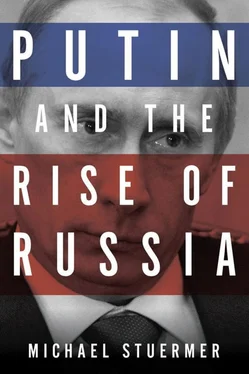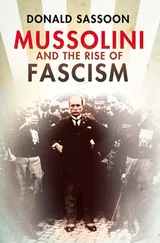Michael Stuermer
PUTIN AND THE RISE OF RUSSIA
The author is indebted to many people who have, through their ideas, expertise and advice, contributed to the concept of this book. First and foremost I wish to thank Ms Katja Machotina from St Petersburg, Russia and Munich, Germany who has given me invaluable help and advice, asking questions and providing answers, and checking much of the detail.
Many diplomats, active and retired, have given advice, some have provided information and also source material otherwise difficult to obtain. Among them the late Dr Otto von der Gablenz, Dr Ernst-Georg von Studnitz, Dr Hans von Ploetz, Dr Michael Libal, Dr Hermann Freiherr von Richthofen, Dr Eberhard von Puttkamer, and last but not least Dr Hans-Georg Wieck who, as the head of Bundesnachrichtendienst in Pullach, was my neighbour in Ebenhausen while I was director of Stiftung Wissenschaft and Politik. I should also like to acknowledge the help received from Russia’s ambassador to Berlin Wladimir Kotenew. I recall many conversations with the Italian ambassador to Berlin Antonio Puri Purini. Ambassador (ret.) Robert Blackwill (ex NSC), Washington and now with the RAND-Corporation Santa Monica, with General (ret.) Klaus Naumann, with Professor Lothar Ruehl, State Secretary MoD (ret.), Bonn, with the Finnish Ambassador to Berlin René Nyberg, and also with John Kornblum, former US ambassador to Germany and now with Lazard Frères.
Dr Regina von Flemming has given me many insights on what it means to do business in Russia, as has Dr Axel Lebahn, formerly of Deutsche Bank, Göttingen.
Dr Alexander Rahr, DGAP, Berlin, has contributed much expertise on personalities and problems. Professor Sergei Karaganow, Moscow, has opened many doors for me. Dmitri Trenin, Carnegie Endowment, Moscow, has been a constant source of inspiration, and likewise Harvard Professor Marshall Goldman. Important advice on financial matters was given by Kurt Viermetz, Chairman of the Overseeing Board, Deutsche Borse AG, Frankfurt. Dr Gerhard Saoebathil, a Eurocrat of the best kind, formerly in Berlin and now Brussels, has contributed his vast experience on EU-Russian relations.
Dmitry Tulchinsky, RIA Novosty, Berlin, has been helpful in arranging various excursions to Russia. Dr Klaus Joachim Herrmann, Neues Deutschland, Berlin, has helped with some of the pictures.
Of course, the economic aspects of Russia’s standing in the global market place are of crucial importance, and I wish to thank, among others, Dr Klaus Mangold and Dr Oliver Wieck from Ost-Ausschuss der Deutschen Wirtschaft, Berlin. Prof. Dr Klaus-Ewald Holst, CEO, Verbundnetz Gas AG (VNG) Leipzig, has provided many insights into the working of the energy industry.
I have also profited immensely from conversations with Russian experts such as Lilia Shevtsova, Carnegie Endowment, Moscow; Vladimir Ryshkow, Member of Duma; Vyacheslav Nikonov, Editor in Chief of Strategija Rossii, Moscow; Alexei Arbatov, Member of Duma, Moscow.
I would also like to acknowledge the insights provided over many years by friends like Ivar Tangen, Secretary General, The Norwegian Energy Foundation, Oslo; Dr Ulrich Schlie, MoD, Berlin; and last but by no means least, Dr Peter Scholl-Latour, Berlin and Paris.
Finally I feel very much indebted to the late George F. Kennan who, while at the Institute for Advanced Study in Princeton many years ago, through conversation and writing, gave me many insights into the historical forces at work inside the Soviet Union and Russia.
While I thank all of those who have accompanied, wittingly or unwittingly, the writing of this book over many years, the responsibility for what I offer the reader in terms of information and judgement is, of course, entirely mine.
Michael Stuermer Berlin and Ebenhausen, August 2008
Putin in 1994: ‘What happens to ethnic Russians beyond our borders is for us an existential question.’

The new currencies of power: Gas and pipelines for the empire. Targeting the European market.

7 October 1952:Putin born in Leningrad, growing up in rough neighbourhood
1953:Stalin dies
1973/74:first oil price hike
1975:Putin graduates at Law Department of Leningrad State University (while also working for the Leningrad Directorate of KGB)
1975:Helsinki Final Act
1978/79:second oil price hike, crisis thoughout the West
July 1982:in Lebanon war Israeli Air Force shoots down 70 Syrian MIGS, shock in Moscow
1982/83:Juri Andropov Kremlin Chief
1985:oil price breaks down, a boost for the West, catastrophe for Russia
1986:Chernobyl burnout, Gorbachev demands perestroika and glasnost
1987:sweeping arms control agreements between USSR and USA (INF Treaty)
9 November 1989:fall of Berlin Wall
1990:‘Two plus Four’ negotiations, NATO offers ‘brotherly hand’, German unification: Putin adviser to Mayor Anatoli Sobchak on international affairs after KGB work in Dresden, DDR from 1985
June 1991-96:Putin head of administration of St Petersburg Mayor’s Office
June 1996-March 1997:Putin joins Russian presidential administration, deputy to chief of Main Control Directorate, Presidential Property Management Department
1998:Putin appointed deputy chief of presidential administration
1998/99:Putin head of FSB
Summer 1998:financial crisis in Russia, oil at USD 10
August 1998:financial collapse and default
September 1998:Yeltsin appoints Evgeny Primakov prime minister
1999:NATO widening includes ex-Warsaw Pact countries
Spring 1999:tense political situation in Russia. Kremlin loses control over events
1999:Putin appointed Secretary of the Security Council
August 1999:Chechen fighters headed by Shamil Basayev invade Northern Republic of Daghestan
August 1999:Duma confirms appointment of Putin as Premier
September 1999:second Chechen War starts
31 December 1999:Yeltsin nominates Putin his successor
March 2000:Putin elected President of Russia
August 2000:Submarine Kursk lost at sea, crisis of Putin’s leadership
November 2000:clampdown on independent media
March 2001:Sergei Ivanov appointed defence minister
Spring 2001:proclamation of ‘managed democracy’, aka ‘sovereign democracy’
June 2001:creation of Shanghai Cooperation Organization (China, Russia, Kazakhstan, Kyrgyzstan, Tajikistan, Uzbekistan)
Fall 2001:Russia cooperates with US in war against Taliban in Afghanistan
December 2001: United States withdraws from ABM Treaty
October 2002:terrorist action at Dubrovka theatre in Moscow. Rescue attempt by federal forces leaves 120 dead
November 2002:EU-Russia summit in Brussels
March 2003:second Iraq War
Читать дальше













